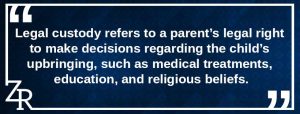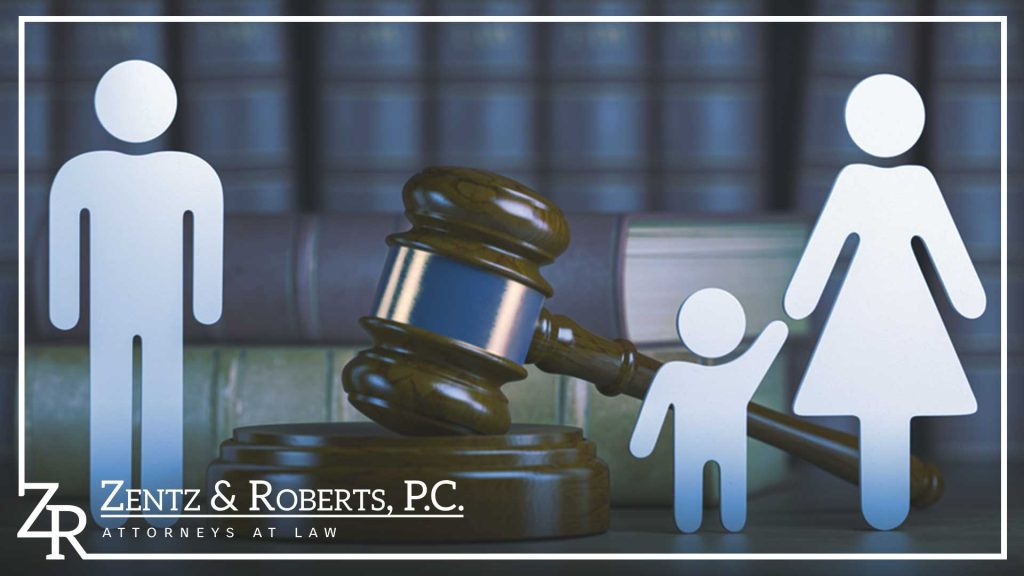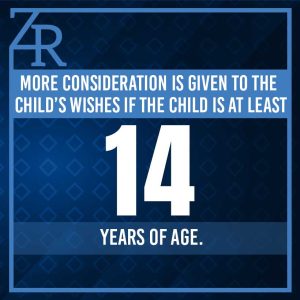Child Custody Lawyers in Indianapolis
Advocates For Your Children And Your Parental Rights
 Going through a divorce or separation is challenging enough, but these matters can be even more challenging and stressful to navigate when children are involved. It’s understandable that, as a parent, you only want what is best for your child, but this can often lead to emotional disputes that can easily escalate.
Going through a divorce or separation is challenging enough, but these matters can be even more challenging and stressful to navigate when children are involved. It’s understandable that, as a parent, you only want what is best for your child, but this can often lead to emotional disputes that can easily escalate.
At Zentz & Roberts, P.C., we provide compassionate guidance and clear advice to help you and the other party reach a reasonable child custody agreement. Our child custody lawyers are devoted to helping families navigate these complex conflicts to ensure the best outcome in a positive and productive manner. Our experienced team can provide mediation, negotiation, and litigation services tailored to your individual situation.
Let’s discuss your custody concerns: Start with a free consultation at our Indianapolis office. Call today at 317-220-6056.
Child Custody Law Definition in Indiana
The purpose of laws concerning child custody in Indiana is to ensure the best decision is made concerning parental rights and the best interests of the child. Indiana courts prefer that parents work child custody matters out between themselves. However, when that is not possible, a judge will get involved to resolve the issue in a custody trial.
It’s not uncommon for both parents in these situations to have disputes and disagreements, which is why it’s often necessary to work with a child custody lawyer who can defend your rights if the case goes to trial. A child custody lawyer can also help both parties reach an agreement to avoid the case going to court.
What is the Difference Between Legal and Physical Custody?
When you are preparing for a child custody case in Indiana, it’s helpful to understand the basic principles involved in these types of cases. Child custody is essentially made up of two elements: legal custody and physical custody.
Legal Custody
 Legal custody refers to a parent’s legal right to make decisions regarding the child’s upbringing, such as medical treatments, education, and religious beliefs. If a parent is granted sole legal custody, they do not have to consult the other parent before making any decisions concerning the child. With joint custody, both parents have the right to be involved in the decisions made and one parent cannot make decisions without the other’s consent.
Legal custody refers to a parent’s legal right to make decisions regarding the child’s upbringing, such as medical treatments, education, and religious beliefs. If a parent is granted sole legal custody, they do not have to consult the other parent before making any decisions concerning the child. With joint custody, both parents have the right to be involved in the decisions made and one parent cannot make decisions without the other’s consent.
Physical Custody
Physical custody refers to where the child primarily lives. In Indiana, this is referred to as the custodial parent’s residence. The custodial parent is granted primary physical custody and the non-custodial parent is granted parenting time as Indiana emphasizes the importance of both parents getting to spend time with their child. Indiana would prefer that both parents work together to raise a child, even if separated. However, sole physical custody could be granted if necessary.
Sole physical custody is usually granted if one parent is unable to provide proper care for the child due to housing instability, substance abuse, neglect, abuse, or mental health issues. If shared physical custody is granted, the child will split their time between both parents.
What Makes a Parent Unfit?
An unfit parent is someone who is unable to provide proper guidance, care, and support for a child. Factors that can play a role in determining whether a parent is fit for custody can include:
- Life situations: This can include not having the income to care for or support a child or not having stable housing. This can also include lifestyle choices or patterns of behavior that could negatively affect the child, such as anger issues, problems with substance abuse, gambling addictions, and generally being incapable of making good decisions.
- Mental health issues: If a parent has serious mental health issues that could affect their ability to provide support and make good decisions, this could also contribute to them being deemed an unfit parent. Certain mental health issues, for example, could make a parent a danger to both themselves and the child.
- Physical health issues: If the parent has a severe physical health condition, this could also lower their chances of being awarded custody. If a parent is seriously ill and bedridden or disabled, for example, the court could see this as meaning they would not be able to adequately support and care for the child.
The Child Custody Case Process in Indiana
When a divorce or separation is filed, the court will note if there are any minor children listed on the documents filed. If so, the court will be on notice that the divorce must address the issue of child custody and parenting time.
 If both parents can reach an agreement without getting the court involved, they can simply submit the child custody agreement for the court to review and approve. If both parents don’t agree, however, it is wise to engage the counsel of an experienced Indiana child custody lawyer.
If both parents can reach an agreement without getting the court involved, they can simply submit the child custody agreement for the court to review and approve. If both parents don’t agree, however, it is wise to engage the counsel of an experienced Indiana child custody lawyer.
A lawyer can help with mediation and negotiations, which could help both parties reach an agreement without the issue turning into a legal custody battle. However, if the conflicts cannot be resolved, the case will go to court.
If this happens, the court will likely require the parents and even the child to be evaluated by third parties to determine whether they are fit to parent and have custody. It is also important to work with child custody lawyers at this stage as they can handle litigation, protect your rights, and help you better understand what to expect during the custody dispute and how best to move forward.
When making custody decisions, the court will consider various factors, including:
 The age and sex of the child.
The age and sex of the child.- The wishes of the child’s parent or parents.
- The wishes of the child, with more consideration given to the child’s wishes if the child is at least fourteen (14) years of age.
- The interaction and interrelationship of the child with the child’s parent or parents, the child’s sibling, and any other person who may significantly affect the child’s best interests.
- The child’s adjustment to the child’s home, school, and community.
- The mental and physical health of all individuals involved.
- Evidence of a pattern of domestic or family violence by either parent.
Child Custody Modification
Child custody agreements can be changed. If circumstances change after legal and physical custody have been decided, a parent may request a modification or change order, but it must be approved by the court.
The court can only modify a child custody order if the modification is in the best interest of the child(ren) and there is a substantial change in one or more of the factors the court may consider in making an initial custody determination.
 If the changes desired pertain to child support payments, the arrangement can only be modified if making payments is no longer reasonable or financially feasible for the parent. Child support payment agreements can also be modified after one year if the amount of support ordered to be paid differs by more than 20% from the amount specified in child support guidelines.
If the changes desired pertain to child support payments, the arrangement can only be modified if making payments is no longer reasonable or financially feasible for the parent. Child support payment agreements can also be modified after one year if the amount of support ordered to be paid differs by more than 20% from the amount specified in child support guidelines.
It’s worth noting, however, that if both parents are in agreement, they are free to modify child support obligations. This can be done by completing the child support obligation worksheet. If both parties cannot agree, then they may then seek a modification by filing a petition with the court.
If you need help with child support or child custody modification, child custody lawyers can help. They can offer you guidance and help walk you through the process to ensure the best possible outcome.
Zentz & Roberts P.C. – Child Custody Lawyers in Indianapolis
Our child custody lawyers at Zentz & Roberts P.C. are well-versed in all aspects of child custody and can help with a range of situations, including:
- Department of Child Services cases (helping parents regain custody after DCS removal)
- CHINS interventions (Child in Need of Services) for abuse or neglect
- Petitions for custody by grandparents or other extended family
- Paternity actions for child support or visitation rights
- Parent relocation (moving the kids away from Indiana)
- Enforcement of child support or visitation orders
- Modification of child support
- Modification of custody orders or parenting plans

Although our lawyers deal with these issues every day, we know these are tense times for you and your kids. We strive to educate and support our clients throughout the process to alleviate their stress and help them make good decisions.
We provide a free initial consultation. Call our Indianapolis law office at 317-220-6056 to schedule a time or use our online form to tell us about your situation. Ask about our flexible payment plans to ensure you have timely access to the quality legal representation you need.
***Please note: This page is not intended to give specific legal advice but is meant for information purposes only. Contact us to discuss your case***



 The age and sex of the child.
The age and sex of the child.